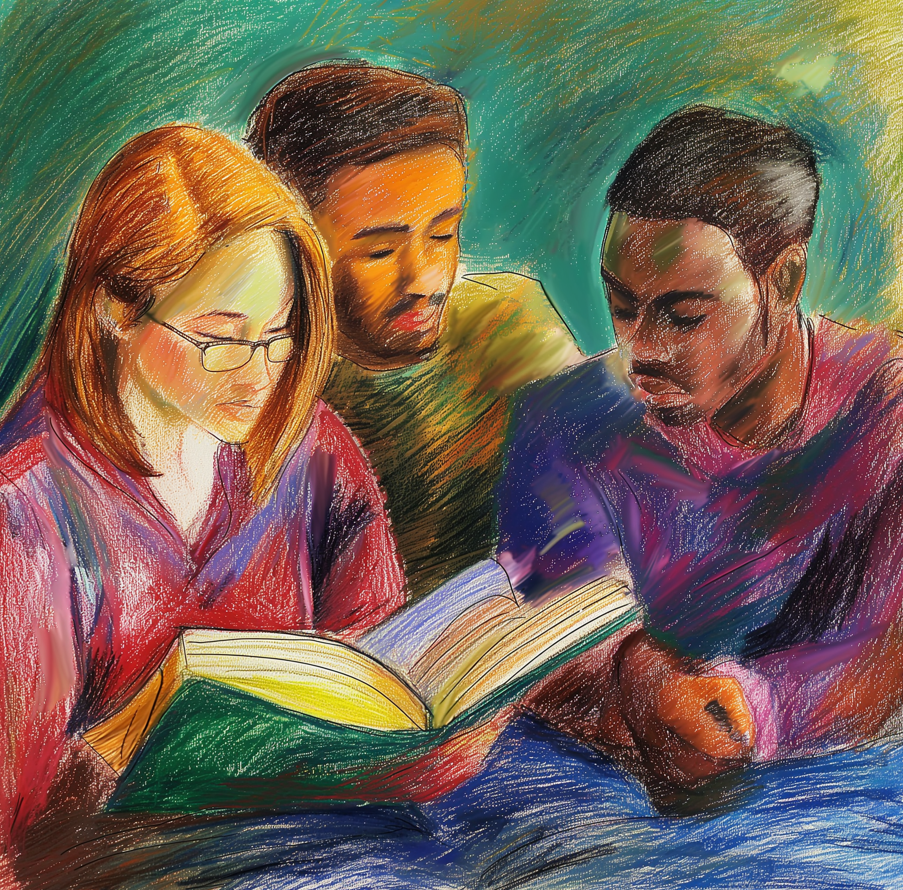Learning Philosophy

Philosophy Pillars
LearnCUID operates on a structured yet flexible learning philosophy. It is designed to immerse students and young adults in unfamiliar cultural contexts through collaborative research, mentorship, and digital tools. The philosophy of LearnCUID is shaped by three core pillars: exploratory learning, networked collaboration, and cultural immersion.
Exploratory Learning: Embracing the Unknown
At the heart of LearnCUID’s philosophy is the idea that learning happens best when students actively engage with unfamiliar content. Unlike formal education settings where students follow predefined curricula, LearnCUID places participants in new cultural environments where they must navigate, research, and synthesize knowledge on their own.
Key Aspects of Exploratory Learning in LearnCUID:
- First-Time Learning Approach: Participants are intentionally exposed to cultural topics they have no prior knowledge of, forcing them to develop curiosity, adaptability, and research skills.
- Self-Directed Inquiry: Instead of passively consuming information, learners seek out resources, interpret findings, and construct knowledge collaboratively.
- Open-Ended Discovery: There are no fixed answers—learning is process-driven rather than result-driven, encouraging students to explore multiple perspectives.
Networked Collaboration: Learning as a Social Process
Knowledge in LearnCUID groups is distributed across digital platforms, mentors, peers, and cultural experts.
Key Aspects of Networked Collaboration in LearnCUID:
- Mentorship-Driven Guidance: Each group has a mentor who provides support, access to rare materials, and guidance, but does not act as a traditional instructor.
- Peer-to-Peer Learning: Participants teach each other, engaging in knowledge-sharing and critical discussions within small learning groups.
- Digital and Social Networks: Learning occurs across multiple online platforms (shared repositories, discussion forums, video calls, and collaborative tools like Miro or Google Drive).
- Interdisciplinary Approach: Students from different academic backgrounds contribute diverse perspectives, enriching the learning experience.
Cultural Immersion: Learning Beyond Books
LearnCUID emphasizes cultural understanding through direct engagement rather than textbook knowledge. Participants must experience culture through artifacts, stories, language, and digital interactions, making learning authentic and deeply personal.
Key Aspects of Cultural Immersion in LearnCUID:
- Engagement with Primary and Rare Sources: Groups access private collections, oral histories, historical manuscripts, and digital archives to uncover cultural narratives.
- Cross-Cultural Interaction: Participants connect with native speakers, cultural experts, and local communities to deepen their understanding.
- Active Interpretation and Synthesis: Learners analyze and compare historical vs. modern interpretations of cultural themes, helping them develop critical thinking and cultural sensitivity.
- Multimodal Learning: Cultural learning happens through audio recordings, visual art, digital storytelling, and interactive discussions, rather than passive reading.
Reflection and Metacognition: Learning How to Learn
LearnCUID encourages participants to reflect on their learning process, biases, and challenges, helping them develop metacognitive awareness (thinking about how they learn).
Key Aspects of Reflection in LearnCUID:
- Structured Reflection Sessions: At the end of each research cycle, learners engage in group reflections, self-evaluations, and mentor feedback sessions.
- Cultural Self-Awareness: Participants analyze how their own cultural perspectives shape their interpretations of new knowledge.
- Iterative Learning Process: Mistakes, misunderstandings, and reinterpretations are valued as part of the learning journey rather than failures.
Digital Literacy and Critical Thinking: Navigating Information Wisely
Since LearnCUID is a digital-first learning initiative, it prioritizes developing digital literacy skills to help learners critically evaluate online information, discern credible sources, and engage with digital content responsibly.
Key Aspects of Digital Literacy in LearnCUID:
- Critical Source Analysis: Learners assess the reliability of digital content, distinguish between biased and objective sources, and cross-check interpretations.
- Collaborative Knowledge Production: Participants do not just consume knowledge; they actively contribute to shared digital repositories, discussion forums, and research publications.
- Ethical Engagement with Digital Resources: Participants learn how to respect cultural ownership, cite sources properly, and navigate language barriers in digital learning spaces.
Conclusion
The philosophy of LearnCUID is not about memorization or passive learning—it is about engagement, interaction, and transformation. By pushing learners into unfamiliar cultural spaces and equipping them with mentorship, peer networks, and digital tools, LearnCUID fosters lifelong learning, intercultural empathy, and the ability to think critically in a digital age.